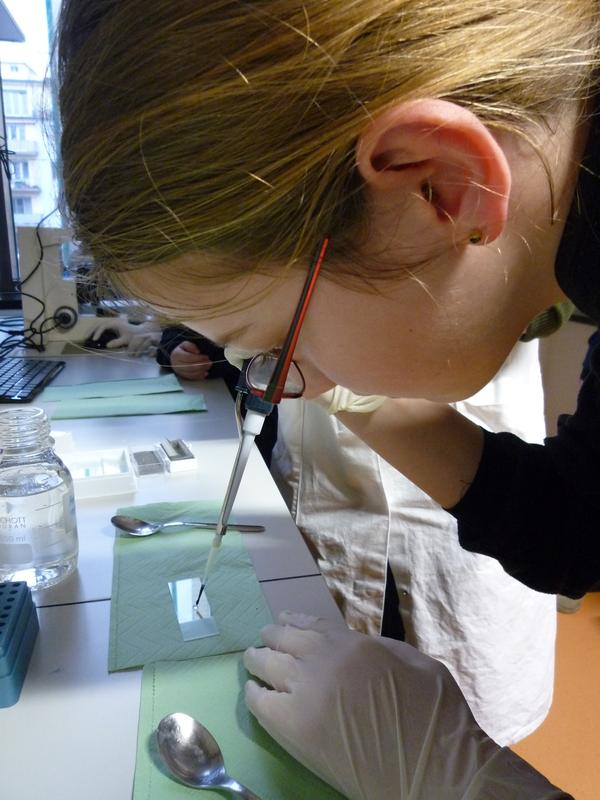Young people discover the "Learning Center"

School projects have a tradition at the Graz K1 Competence Centre RCPE. The "brain center" project is the fifth school project to deal with the latest research results of brain research experience. © RCPE
“eternal space …” – is not only present in outer space. Also in the fascinating world of the human brain neurons many undiscovered worlds await their discoverers and explorers. In the school project “The Brain Center” children and adolescents – primary school as well high school students – in a fun way immerse deeply into this brain-world. So young people learn how the brain controls the body, which processes change the brain and how they can bring their own brain at school to peak performance.
In collaboration with the three universities in Graz and three companies children from six schools in Graz learn through practical “hands-on activities” to develop different approaches to the subject: Thereby, during two school years courses at universities and companies are developed and passed.
To top it off, there will be the “Brain Day” in June 2018 jointly presenting the participating students, scientists, entrepreneurs, the latest and most exciting insights into the wonderful world of the human brain neurons.
Goals and motivation
“With our project ,Brain Center' we want the participating children and people's interest and enthusiasm for science and technical subjects to be aroused and to get young people interested in an applied research career,” explain RCPE CEO Univ.-Prof. Dr. Johannes Khinast and Dr. Thomas Klein their intention.
Project Manager Mag Simone Klein, head of the departments of Human Resources, Marketing & IT at RCPE, adds: “Especially important for us is a gender balance in the entire project and the inclusion regardless of their social or geographical origin of children and adolescents.”
Through that diversity and scientific competence, the RCPE proves itself: The experts of RCPE and project facilitators come from all over the world and are accustomed to working in multidisciplinary as multicultural teams.
The project partners
Project leader is the RCPE Research Center Pharmaceutical Engineering GmbH – a K1 competence center owned by the Graz University of Technology, (65%), the Karl-Franzens-University Graz (20%) and the Joanneum Research GmbH (15%). The RCPE has put within the tender “talents regional” the Austrian Research Promotion Agency, FFG, already handled four projects in recent years, allowing pupils to interact with institutions of science and research on one hand and companies on the other hand.
Thematically neurosciences have for more than ten years been at the focus of the Styrian research location. Today, all three major universities of Graz (Karl-Franzens-University Graz, Graz University of Technology and Medical University of Graz) research the brain at interdisciplinary level.
Accordingly, the following academic partners are involved:
• University of Graz, Institute of Educational Sciences (IEB)
• University of Graz, Department of Psychology
• Medical University of Graz, Department of Neurosurgery, Research Unit for Experimental Neurotraumatology
• Graz University of Technology, Institute for Knowledge Discovery (ISD)
Corporate Partners are:
• RCPE Research Center Pharmaceutical Engineering GmbH (project leader)
• QPS Austria GmbH
• APOMEDICA Pharmazeutische Produkte GmbH
Participating schools are:
• Volksschule Hönigtal, Kainbach b. Graz
• Volksschule Graz-Waltendorf
• Volksschule Thal, Thal bei Graz
• Akademisches Gymnasium Graz
• BG, BRG, MG Dreihackengasse, Graz
• BG/BRG Lichtenfels, Graz
Mentors are:
• academia Presentation Center, Dr. MMag. Jolanta Paltauf
• Bildungs- & Image-Management, Katja Polz
Project duration:
Two school years – from September 2017 to July 2018
Media Contact
All latest news from the category: Science Education
Newest articles

Innovative 3D printed scaffolds offer new hope for bone healing
Researchers at the Institute for Bioengineering of Catalonia have developed novel 3D printed PLA-CaP scaffolds that promote blood vessel formation, ensuring better healing and regeneration of bone tissue. Bone is…

The surprising role of gut infection in Alzheimer’s disease
ASU- and Banner Alzheimer’s Institute-led study implicates link between a common virus and the disease, which travels from the gut to the brain and may be a target for antiviral…

Molecular gardening: New enzymes discovered for protein modification pruning
How deubiquitinases USP53 and USP54 cleave long polyubiquitin chains and how the former is linked to liver disease in children. Deubiquitinases (DUBs) are enzymes used by cells to trim protein…



